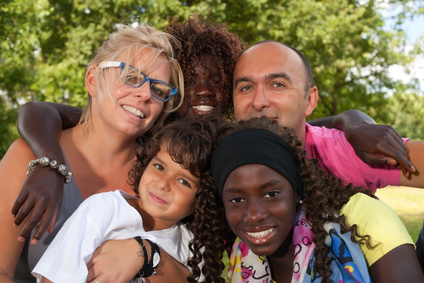
Adoptive families–whether they’ve adopted transracially or not–experience being seen as different and sometimes, as “less than” other families. Living as a multicultural family amplifies the obvious differences and the frequency of encountering prejudice.
In multicultural families, it is important that parents not confuse unconditional love with “color blindness” because this can lead us to overlook the realities of their experiences in the world beyond our families.” (We explored “color blindness” in an earlier blog, Adoption Is a We Story.) Although we wish the world would not treat our kids differently/harshly because of their race, prejudice does exist and we must prepare kids to confront it.
What can we do to create change, awareness, and equality? Watch Dr. Joy DeGruy’s video. She’s an African-American woman who talks about the impact of “white privilege” while shopping with her can-pass-as-Caucasian sister-in-law. Notice the dramatic difference their perceived race made in shaping their experience, even for something as routine as grocery shopping. Consider how different Dr. DeGruy’s options were from her sister-in-law’s. Imagine if she had spoken up. How differently would the cashier and the other shoppers have responded?
Thanks to
Imagine you and your transracially child in a similar circumstance. How have you handled it in the past? How will you now approach it? Develop a blueprint for your family. Discuss the issue straightforwardly. Ask your kids how their experiences compare to the one Dr. DeGruy described. Then talk about their feelings, strategies, and concerns. Ask them how you can support them. Listen to your child when he reports an incident of racial bigotry. Consider that he’s probably treated differently when you are present to “vouch” for him than when he is in the world on his own. When your child reports that he’s experienced racial profiling, does it make your gut clench? Do you want to fix it or explain the experience away as a product of their imagination?
Educating your transracially adopted child to walk in a racially aware world may be awkward, messy, and painful. But it is essential. With this video in mind, how will you use “white privilege” to shine a light and blaze a new path to change?
Thanks to Leanna @alldonemonkey.com/ for bringing Dr. DeGruy’s video to our attention



Our children’s birth father was from a Caribbean Island and they are very fair skinned. As they have witnessed the discrimination and judgment referenced in the blog, our children chose to identify themselves as Caucasian. I respect their chose and also wish they would acknowledge all of their heritage.
Racism can be conscious or unconscious. It is important as you suggested to have a plan to deal with it so that you don’t get blindsided. If you are prepared than it will be easier to talk about and handle it with your children. I know in my own family I was naive and denied racism’s existence. It takes an awareness of its existence whether blatant or subtle to begin to eradicate it. I feel like having children of a different race than myself has really opened my eyes to my own prejudices and biases. It is through acknowledgement that we can do something about it.